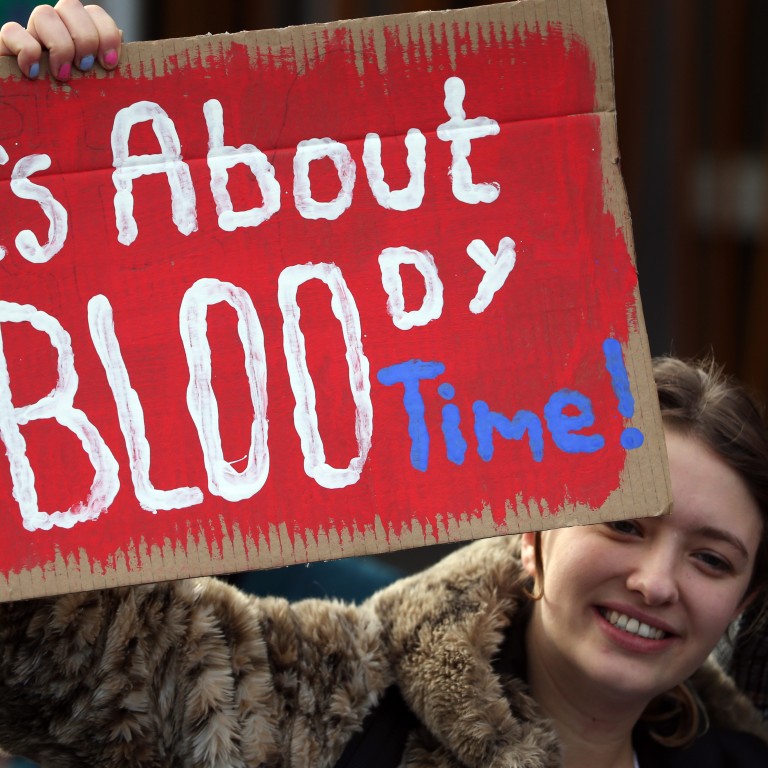
As Scotland makes menstrual products available for free, time for medical science to reckon with women’s pain
- Ensuring universal access to free menstrual products acknowledges that periods can be disruptive of life and health, but governments the world over have much more to do
- Medicine has a long history of ignoring women’s symptoms and limited research into their health problems, such as endometriosis and PCOS
This should only be the beginning. With Scotland showing the way, there are so many other period-related areas that need governmental support.
Endometriosis, a condition in which the cells of the inner lining of the uterus implant and grow abnormally in other parts of the body, was officially “discovered” in 1860, but endometriosis-associated symptoms were reported as far back as ancient Egypt. As for PCOS, a condition in which the ovaries produce an abnormal amount of male sex hormones or androgens, it was officially reported for the first time in 1721, but Diseases of Women by Hippocrates suggests that ancient Greece already had some knowledge of it.
Today, it is estimated that each of these conditions affects roughly one of 10 women around the world, from their first period to menopause.
Medicine has a long history of ignoring women’s symptoms and limited research into their health problems. Elinor Cleghorn opens her book Unwell Women by observing: “The history of medicine, of illness, is every bit as social and cultural as it is scientific.”
For the Western world, the (white) male body has been the benchmark of anatomy since Greek antiquity. Physical differences were perceived as deviations from what was considered the norm. Fuelling this logic, Aristotle othered the female body, describing it as “a mutilated male” with “cold” and passive reproductive organs.
As a result of these biases, until the 17th century, endometriosis was attributed to demonic possession and witchcraft. It was then linked to nymphomania, and was later reclassified as “hysteria” by Sigmund Freud, the founder of psychoanalysis. As for PCOS, women were either singled out as witches for being infertile or “bearded women” due to a higher testosterone level.
These harmful stereotypes have persisted across time, and aren’t being challenged perhaps because most people researching, practising and teaching medicine are men. Women are still perceived as excessively emotional and as attention seekers, if not hypochondriacs. Studies have shown that women’s physical pain is disregarded or taken less seriously than men’s. Doctors still tend to view women’s reporting of pain as a reflection of their emotional state.
‘I wish I was a man’, says Zheng after cramps end French Open bid
Despite being a condition that is very easy to understand, “the ignorance of health professionals is dramatic,” Dr Isabella Chanavaz-Lacheray, a specialist in reproductive medicine, told Marie-Claire France.
This ignorance – sometimes leading to medical negligence – usually delays a correct diagnosis for years. But it also results in a lack of research funding. For example, in the UK, endometriosis and PCOS are just as common as diabetes, but “the proportion of funding that goes into diabetes far exceeds the levels of funding that goes into endometriosis,” noted Professor Andrew Horne at the University of Edinburgh. A survey by ResearchGate, a social networking site for researchers, of studies on the site found five times more research on erectile dysfunction, which affects 19 per cent of men, than on premenstrual syndrome, which affects 90 per cent of women.
The treatment of endometriosis and PCOS is a great example of medicine’s long history of disregarding women’s pain. It’s time to change. Awareness is important, better representation necessary, investment crucial. But to kickstart the change, listen to women.
Salomé Grouard is production editor, social media, at the Post and a member of Lunar, an initiative that highlights key issues related to women and gender equality in Asia

